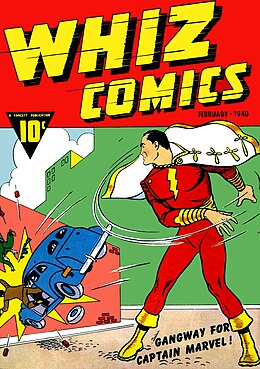Our website is made possible by displaying online advertisements to our visitors.
Please consider supporting us by disabling your ad blocker.
Superhero
This article has multiple issues. Please help improve it or discuss these issues on the talk page. (Learn how and when to remove these messages)
|

A superhero or superheroine is a fictional character who typically possesses superpowers or abilities beyond those of ordinary people, is frequently costumed concealing their identity, and fits the role of the hero, typically using their powers to help the world become a better place, or dedicating themselves to protecting the public and fighting crime. Superhero fiction is the genre of fiction that is centered on such characters,[1] especially, since the 1930s, in American comic books (and later in Hollywood films, film serials, television and video games), as well as in Japanese media (including kamishibai, tokusatsu, manga, anime and video games).
Superheroes come from a wide array of different backgrounds and origins. Some superheroes (such as Spider-Man and Superman) possess non-human or superhuman biology, while others (such as Doctor Strange and Captain Marvel) use and practice magic to achieve their abilities. Others (such as Iron Man and Batman) derive their status from advanced technology they create and use.[2][3][4] The Dictionary.com definition of "superhero" is "a figure, especially in a comic strip or cartoon, endowed with superhuman powers and usually portrayed as fighting evil or crime",[5] and the Merriam-Webster dictionary gives the definition as "a fictional hero having extraordinary or superhuman powers; also: an exceptionally skillful or successful person."[6] Terms such as masked crime fighters, costumed adventurers or masked vigilantes are sometimes used to refer to characters such as the Spirit, who may not be explicitly referred to as superheroes but nevertheless share similar traits.
Some superheroes use their powers to help fight daily crime while also combating threats against humanity from supervillains, who are their criminal counterparts. Often at least one of these supervillains will be the superhero's archenemy or nemesis. Some popular supervillains become recurring characters in their own right.
- ^ "Superhero Definition & Meaning". Merriam-Webster. Archived from the original on November 5, 2014. Retrieved September 7, 2020.
- ^ Niccum, John (March 17, 2006). "'V for Vendetta' is S for Subversive". Lawrence Journal-World. Lawrence, Kansas. Archived from the original on November 14, 2013.
- ^ Gesh, Lois H.; Weinberg, Robert (2002). "The Dark Knight: Batman: A NonSuper Superhero" (PDF). The Science of Superheroes. John Wiley & Sons. ISBN 978-0-471-02460-6. Archived (PDF) from the original on November 6, 2015.
- ^ Lovece, Frank (July 16, 2008). "The Dark Knight". (movie review) Film Journal International. Archived from the original on November 7, 2014. Retrieved February 5, 2009.
Batman himself is an anomaly as one of the few superheroes without superpowers
- ^ "Superhero's | Define Superhero's". Dictionary.com. Archived from the original on November 13, 2014. Retrieved March 26, 2016.
- ^ "Superhero Definition & Meaning". Merriam-Webster. March 22, 2016. Archived from the original on November 5, 2014. Retrieved March 26, 2016.
Previous Page Next Page


